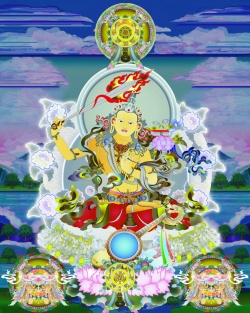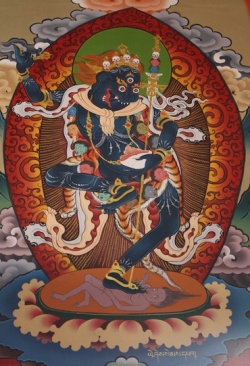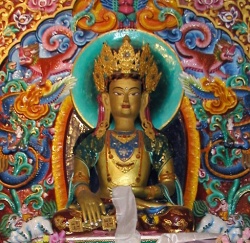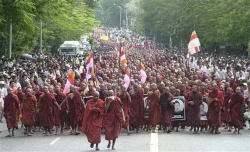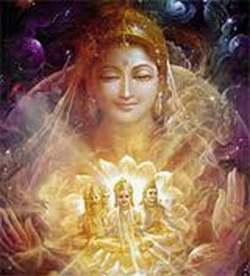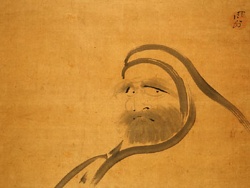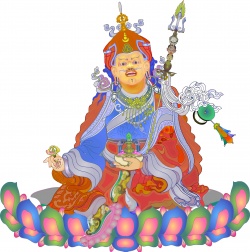The Gospel of Buddha:Chapter 04: The Bodhisatta's Birth
There was in Kapilavatthu a Sakya king,
strong of purpose and reverenced by all men,
a descendant of the Okkakas, who call themselves Gotama,
and his name was Suddhodana or Pure-Rice. [1]
His wife Maya-devi was beautiful as the water-lily and pure in mind as the lotus.
As the Queen of Heaven, she lived on earth, untainted by desire, and immaculate. [2]
The king, her husband, honoured her in her holiness,
and the spirit of truth, glorious and strong in his wisdom
like unto a white elephant, descended upon her. [3]
When she knew that the hour of motherhood was near,
she asked the king to send her home to her parents;
and Suddhodana, anxious about his wife and the child she would bear him,
willingly granted her request. [4]
At Lumbini there is a beautiful grove,
and when Maya-devi passed through it the trees were one mass of fragrant flowers
and many birds were warbling in their branches.
The Queen, wishing to stroll through the shady walks, left her golden palanquin, and,
when she reached the giant Sala tree in the midst of the grove,
felt that her hour had come.
She took hold of a branch.
Her attendants hung a curtain about her and retired.
When the pain of travail came upon her,
four pure-minded angels of the great Brahma held out a golden net to receive the babe,
who came forth from her right side like the rising sun bright and perfect. [5]
The Brahma-angels took the child and placing him before the mother said:
"Rejoice, O queen, a mighty son has been born unto thee." [6]
At her couch stood an aged woman imploring the heavens to bless the child. [7]
All the worlds were flooded with light.
The blind received their sight by longing to see the coming glory of the Lord;
the deaf and dumb spoke with one another
of the good omens indicating the birth of the Buddha to be.
The crooked became straight; the lame walked.
All prisoners were freed from their chains
and the fires of all the hells were extinguished. [8]
No clouds gathered in the skies and the polluted streams became clear,
whilst celestial music rang through the air
and the angels rejoiced with gladness.
With no selfish or partial joy but for the sake of the law they rejoiced,
for creation engulfed in the ocean of pain was now to obtain release. [9]
The cries of beasts were hushed;
all malevolent beings received a loving heart, and peace reigned on earth.
Mara, the evil one, alone was grieved and rejoiced not. [10]
The Naga kings, earnestly desiring to show their reverence for the most excellent law,
as they had paid honour to former Buddhas, now went to greet the Bodhisatta.
They scattered before him mandara flowers,
rejoicing with heartfelt joy to pay their religious homage. [11]
The royal father, pondering the meaning of these signs,
was now full of joy and now sore distressed. [12]
The queen mother, beholding her child and the commotion which his birth created,
felt in her timorous heart the pangs of doubt. [13]
Now there was at that time in a grove near Lumbini Asita,
a rishi, leading the life of a hermit.
He was a Brahman of dignified mien,
famed not only for wisdom and scholarship,
but also for his skill in the interpretation of signs.
And the king invited him to see the royal babe. [14]
The seer, beholding the prince, wept and sighed deeply.
And when the king saw the tears of Asita he became alarmed and asked:
"Why has the sight of my son caused thee grief and pain?" [15]
But Asita's heart rejoiced,
and, knowing the king's mind to be perplexed, he addressed him, saying: [16]
"The king, like the moon when full, should feel great joy,
for he has begotten a wondrously noble son. [17]
"I do not worship Brahma, but I worship this child;
and the gods in the temples will descend from their places of honour to adore him. [18]
"Banish all anxiety and doubt.
The spiritual omens manifested indicate that the child now born
will bring delliverance to the whole world. [19]
"Recollecting that I myself am old,
on that account I could not hold my tears;
for now my end is coming on and I shall not see the glory of this babe.
For this son of thine will rule the world. [20]
"The wheel of empire will come to him.
He will either be a king of kings to govern all the lands of the earth,
or verily will become a Buddha.
He is born for the sake of everything that lives. [21]
"His pure teaching will be like the shore that receives the ship-wrecked.
His power of meditation will be like a cool lake;
and all creatures parched with the drought of lust may freely drink thereof. [22]
"On the fire of covetousness he will cause the cloud of his mercy to rise,
so that the rain of the law may extinguish it.
The heavy gates of despondency will be open,
and give deliverance to all creatures ensnared in the self-entwined meshes of folly and ignorannce. [23]
"The king of the law has come forth
to rescue from bondage all the poor, the miserable, the helpless." [24]
When the royal parents heard Asita's words they rejoiced in their hearts
and named their new-born infant Siddhattha,
that is, "he who has accomplished his purpose." [25]
And the queen said to her sister, Pajapati:
"A mother who has borne a future Buddha will never give birth to another child.
I shall soon leave this world, my husband, the king, and Siddhattha, my child.
When I am gone, be thou a mother to him." [26]
And Pajapati wept and promised. [27]
When the queen had departed from the living,
Pajapati took the boy Siddhattha and reared him.
And as the light of the moon increases little by little,
so the royal child grew from day to day in mind and in body;
and truthfulness and love resided in his heart. [28]
When a year had passed Suddhadana the king made Pajapati his queen
and there was never a better stepmother than she. [29]
Continue Reading
- The Gospel of Buddha: Preface
- The Gospel of Buddha:Chapter 01: Rejoice
- The Gospel of Buddha:Chapter 02: Samsara and Nirvana
- The Gospel of Buddha:Chapter 03: Truth the Saviour
- The Gospel of Buddha:Chapter 04: The Bodhisatta's Birth
- The Gospel of Buddha:Chapter 05: The Ties of Life
- The Gospel of Buddha:Chapter 06: The Three Woes
- The Gospel of Buddha:Chapter 07: The Bodhisatta's Renunciation
- The Gospel of Buddha:Chapter 08: King Bimbisara
- The Gospel of Buddha:Chapter 09: The Bodhisatta's Search
- The Gospel of Buddha:Chapter 10: Uruvela, the Place of Mortification
- The Gospel of Buddha:Chapter 11: Mara, the Evil One
- The Gospel of Buddha:Chapter 12: Enlightenment
- The Gospel of Buddha:Chapter 13: The First Converts
- The Gospel of Buddha:Chapter 14: Brahma's Request
- The Gospel of Buddha:Chapter 15: Upaka
- The Gospel of Buddha:Chapter 16: The Sermon at Benares
- The Gospel of Buddha:Chapter 17: The Sangha
- The Gospel of Buddha:Chapter 18: Yasa, the Youth of Benares
- The Gospel of Buddha:Chapter 19: Kassapa
- The Gospel of Buddha:Chapter 20: The Sermon at Rajagaha
- The Gospel of Buddha:Chapter 21: The King's Gift
- The Gospel of Buddha:Chapter 22: Sariputta and Moggallana
- The Gospel of Buddha:Chapter 23: Anathapindika
- The Gospel of Buddha:Chapter 24: The Sermon on Charity
- The Gospel of Buddha:Chapter 25: Jetavana
- The Gospel of Buddha:Chapter 26: The Three Characteristics and the Uncreate
- The Gospel of Buddha:Chapter 27: The Buddha's Father
- The Gospel of Buddha:Chapter 28: Yasodhara
- The Gospel of Buddha:Chapter 29: Rahula
- The Gospel of Buddha:Chapter 30: Jivaka, the Physician
- The Gospel of Buddha:Chapter 31: The Buddha's Parents Attain Nirvana
- The Gospel of Buddha:Chapter 32: Women Admitted to the Sangha
- The Gospel of Buddha:Chapter 33: The Bhikkhus' Conduct Toward Women
- The Gospel of Buddha:Chapter 34: Visakha
- The Gospel of Buddha:Chapter 35: The Uposatha and Patimokkha
- The Gospel of Buddha:Chapter 36: The Schism
- The Gospel of Buddha:Chapter 37: The Re-establishment of Concord
- The Gospel of Buddha:Chapter 38: The Bhikkhus Rebuked
- The Gospel of Buddha:Chapter 39: Devadatta
- The Gospel of Buddha:Chapter 40: Name and Form
- The Gospel of Buddha:Chapter 41: The Goal
- The Gospel of Buddha:Chapter 42: Miracles Forbidden
- The Gospel of Buddha:Chapter 43: The Vanity of Worldliness
- The Gospel of Buddha:Chapter 44: Secrecy and Publicity
- The Gospel of Buddha:Chapter 45: The Annihilation of Suffering
- The Gospel of Buddha:Chapter 46: Avoiding the Ten Evils
- The Gospel of Buddha:Chapter 47: The Preacher's Mission
- The Gospel of Buddha:Chapter 48: The Dhammapada
- The Gospel of Buddha:Chapter 49: The Two Brahmans
- The Gospel of Buddha:Chapter 50: Guard the Six Quarters
- The Gospel of Buddha:Chapter 51: Simha's Question Concerning Annihilation
- The Gospel of Buddha:Chapter 52: All Existence is Spiritual
- The Gospel of Buddha:Chapter 53: Identity and Non-Identity
- The Gospel of Buddha:Chapter 54: The Buddha Omnipresent
- The Gospel of Buddha:Chapter 55: One Essence, One Law, One Aim
- The Gospel of Buddha:Chapter 56: The Lesson Given to Rahula
- The Gospel of Buddha:Chapter 57: The Sermon on Abuse
- The Gospel of Buddha:Chapter 58: The Buddha Replies to the Deva
- The Gospel of Buddha:Chapter 59: Words of Instruction
- The Gospel of Buddha:Chapter 60: Amitabha
- The Gospel of Buddha:Chapter 61: The Teacher Unknown
- The Gospel of Buddha:Chapter 62: Parables
- The Gospel of Buddha:Chapter 63: The Widow's Two Mites and the Parable of the Three Merchants
- The Gospel of Buddha:Chapter 64: The Man Born Blind
- The Gospel of Buddha:Chapter 65: The Lost Son
- The Gospel of Buddha:Chapter 66: The Giddy Fish
- The Gospel of Buddha:Chapter 67: The Cruel Crane Outwitted
- The Gospel of Buddha:Chapter 68: Four Kinds of Merit
- The Gospel of Buddha:Chapter 69: The Light of the World
- The Gospel of Buddha:Chapter 70: Luxurious Living
- The Gospel of Buddha:Chapter 71: The Communication of Bliss
- The Gospel of Buddha:Chapter 72: The Listless Fool
- The Gospel of Buddha:Chapter 73: Rescue in the Desert
- The Gospel of Buddha:Chapter 74: The Sower
- The Gospel of Buddha:Chapter 75: The Outcast
- The Gospel of Buddha:Chapter 76: The Woman at the Well
- The Gospel of Buddha:Chapter 77: The Peacemaker
- The Gospel of Buddha:Chapter 78: The Hungry Dog
- The Gospel of Buddha:Chapter 79: The Despot
- The Gospel of Buddha:Chapter 80: Vasavadatta
- The Gospel of Buddha:Chapter 81: The Marriage-Feast in Jambunada
- The Gospel of Buddha:Chapter 82: A Party in Search of a Thief
- The Gospel of Buddha:Chapter 83: In the Realm of Yamaraja
- The Gospel of Buddha:Chapter 84: The Mustard Seed
- The Gospel of Buddha:Chapter 85: Following the Master Over the Stream
- The Gospel of Buddha:Chapter 86: The Sick Bhikkhu
- The Gospel of Buddha:Chapter 87: The Patient Elephant
- The Gospel of Buddha:Chapter 88: The Conditions of Welfare
- The Gospel of Buddha:Chapter 89: Sariputta's Faith
- The Gospel of Buddha:Chapter 90: Pataliputta
- The Gospel of Buddha:Chapter 91: The Mirror of Truth
- The Gospel of Buddha:Chapter 92: Ambapali
- The Gospel of Buddha:Chapter 93: The Buddha's Farewell Address
- The Gospel of Buddha:Chapter 94: The Buddha Announces His Death
- The Gospel of Buddha:Chapter 95: Chunda, the Smith
- The Gospel of Buddha:Chapter 96: Metteyya
- The Gospel of Buddha:Chapter 97: The Buddha's Final Entering into Nirvana
- The Gospel of Buddha:Chapter 98: The Three Personalities of the Buddha
- The Gospel of Buddha:Chapter 99: The Purpose of Being
- The Gospel of Buddha:Chapter 100: The Praise of All the Buddhas
